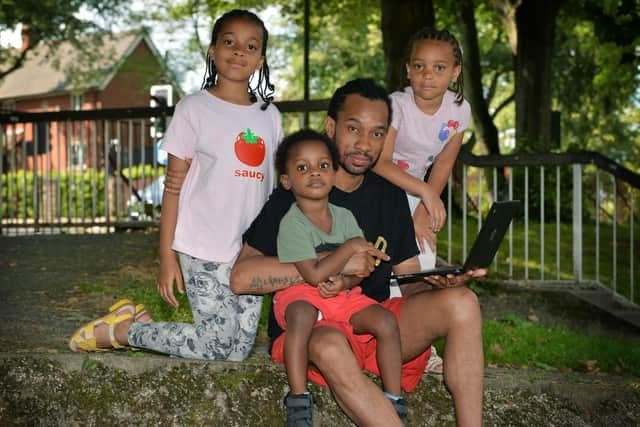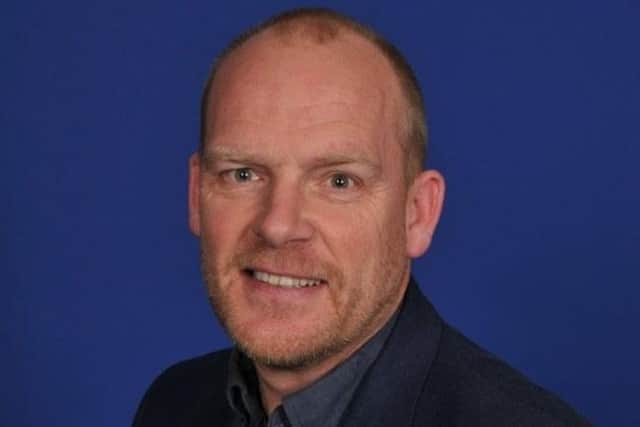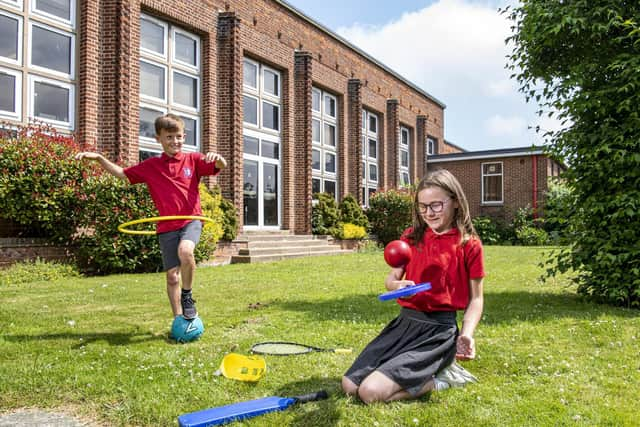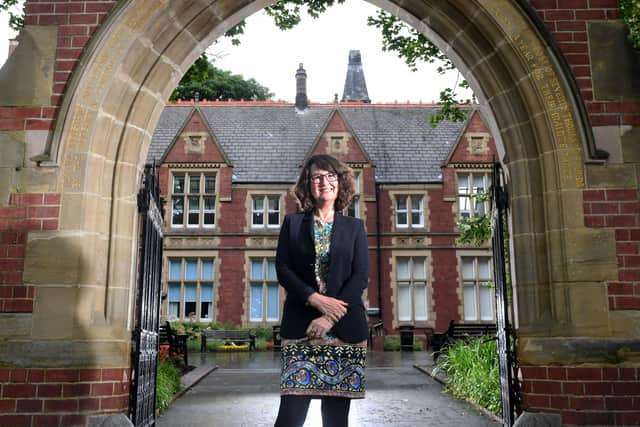'Organised chaos': Inside the Yorkshire education challenge during a pandemic
For parents across the country, the past 18 months have presented challenges which they could never have imagined as the fabric of society was thrown into chaos by the coronavirus pandemic.
Household incomes were placed under immense pressure with mounting unemployment amid the repeated lockdowns, and the nation’s education was plunged into disarray as millions of children were forced to be schooled at home.


Advertisement
Hide AdAdvertisement
Hide AdFather-of-three Robert Robinson readily admits that the past 18 months have been among the toughest he has had to cope with.
Mr Robinson, 36, who lives with his wife, Aneshia, and their two daughters, Rane, aged eight, and River, aged five, and three-year-old son, Storm, in Sheffield, was faced with trying to help with his children’s online education at home during the first lockdown with just a mobile phone to share between them.
He said: “It was very very difficult - there was nothing out there at that point in time from the schools or government to really help us get the educational support that we needed.
“It was organised chaos. We were trying to complete activities and keep up with her schoolwork from my phone, which just wasn’t realistic.”


Advertisement
Hide AdAdvertisement
Hide AdAlongside the demands of homeschooling, there were the added challenges of owning a new food business which placed the couple's finances under immense pressure.
Mr Robinson runs The Personal Chef, a meal food preparation company which was established in 2019, but he was unable to qualify for the Government’s furlough scheme or business grants, instead relying on Universal Credit and Child Tax Credit during the coronavirus outbreak.
But the Robinsons were among 14,000 families across the North of England who were given vital support through a scheme to distribute renovated laptops after a campaign was launched by business and civic leaders to help vulnerable children.
Last summer, Mr Robinson received a laptop as part of the initiative rolled out in Sheffield by the WANdisco firm and a not for profit company, Learn Sheffield.


Advertisement
Hide AdAdvertisement
Hide AdThe charitable organisation accepts donated computers, sending them to Sheffield College to be erased before passing them along to the city’s disadvantaged young people.
But despite the goodwill and community spirit that has emerged in the wake of the pandemic, the region’s schools remain under unrelenting pressure.
On the North Yorkshire coast, Chris Kirkham-Knowles, the headteacher for Newby and Scalby Primary School in Scarborough for the past 18 years, said the past two weeks have been the most disruptive he has ever faced in education.
At the most challenging moment, the school, which caters for more than 420 pupils, saw 45 per cent of pupils off due to having to self-isolate because of Covid-19.


Advertisement
Hide AdAdvertisement
Hide Ad“It’s not over yet - it’s a year where no amount of educational leadership training or experience could have prepared anybody for,” he said. “It has been the most challenging period of leadership in my career.”
Mr Kirkham-Knowles said he had concerns ahead of September for a significant number of schools across the region after extra unplanned spending, due to costs added on due to the pandemic, on already “stretched budgets” and a “substantially” under-funded education recovery plan.
He said: “Young people are a key part of the future of our country and I think it’s really important that they are given the best possible chance of recovery.
“One of my biggest concerns is that there is a lot of rhetoric around what’s needed and very little financial support to put that together.
Advertisement
Hide AdAdvertisement
Hide Ad"The Government declined to fund Sir Kevan Collins' suggested catch-up plan on the grounds that it was too expensive. Instead, they chose to fund a tenth of the cost of the plan.
“The national recovery plan is substantially underfunded in terms of how schools could deliver as part of a package in the local community something that would really address the issues that have arisen during covid for all of our young people.”
The school has introduced a raft of measures to aid its pupils, including using its in-house catering team to bolster the free meals which were provided by the Government.
The school also raised more than £2,000 for the local Rainbow Centre which provides food and other services to people in need in the Scarborough community.
Advertisement
Hide AdAdvertisement
Hide AdA daily mental health session was introduced for all year groups, allowing teachers and children to open up about how they are really feeling.
But Mr Kirkham-Knowles added that due to a number of “last minute” decisions from Education Secretary Gavin Williamson and greater controls than “ever before” from the Department of Education, he is concerned for the start of the new term.
He said: “It’s difficult to look back with great pleasure at the way the DfE has communicated with us. The important thing is that lessons are learned from how schools are communicated with and we move forward.
“Schools have less control now than they ever have had in regards to what is within their curriculum and what they are required to offer.
Advertisement
Hide AdAdvertisement
Hide Ad“The Department for Education is taking greater control of all those elements - so it will be difficult to say whether we can shape that and influence it to ensure we maintain what we managed to do during the covid pandemic.”
Mr Kirkham-Knowles called for a “long-term” plan for education with a renewed focus on education across the region.
He said: “We are really clear that our recovery plan is not a quick fix - what we want is children to have a really clear long term plan for developing their learning.
“We are looking at the children we are faced with everyday and they are coming in with various issues we might not have historically had to deal with but to deal with them as individuals.
Advertisement
Hide AdAdvertisement
Hide Ad“If our system was awash with spare capacity then it wouldn’t be an issue but we are in a position whereby we are having to deliver a higher level of service in terms of supporting an increasing number of vulnerable pupils with resources which are barely enough to deliver our baseline level of service.”
In the higher education sector, the previous two academic years for university students have been greatly disrupted, with many having to spend months off campus.
For Aidan Salari, 18, who will be heading into his second year as an architecture student at Leeds Beckett University in September, he received just four months of face-to-face teaching over the past academic year, one day a week.
The course would normally see students in a studio four days a week, with face-to-face teaching.
Advertisement
Hide AdAdvertisement
Hide AdMr Salari admitted the drop-off in interaction with students has affected him greatly and, with most student societies moving online coupled with the fact he lives at home, he said he had limited opportunities to make friends.
He added: “It’s been very lonely - it has been me in my bedroom, for an entire year, basically.”
While acknowledging that Leeds Beckett University had provided “amazing” support in terms of mental health support, guidance, and sympathy to struggling students, he said he had been left with the feeling of being short-changed after paying £9,250 a year in course fees.
“We have been robbed of the university experience, but we have also been let down in terms of mental well-being.
Advertisement
Hide AdAdvertisement
Hide Ad“We are paying all this money for a course not even being half delivered how it would have been in person.”
A spokesperson from Leeds Beckett University stressed its students and staff were its “priority”, “well established” health and well-being support have been available.
Lucy Brooks, who will be going into her final year at the University of York in September, also told The Yorkshire Post of the huge strains the pandemic had placed on her education.
She said: "We have missed out on the opportunity to socialise and meet new people, it has caused many people to mentally spiral.
Advertisement
Hide AdAdvertisement
Hide Ad“I have never sat university exams in person, meaning that my final year will be my first experience doing this, which is completely unfair.”
Professor Simone Buitendijk, the Vice-Chancellor for the University of Leeds, said that every effort was made to help students cope with the lockdowns.
But she acknowledged that mental health problems for students were “very real” and there was a need for students to return to a physical campus as “quickly as we can”.
She said: “The mental health issues and the isolation are absolutely real and I think we have all suffered in large or small ways from the restrictions that covid brought.
Advertisement
Hide AdAdvertisement
Hide Ad“But I think people are resilient and as a university we have to be incredibly mindful in leadership of what students have missed, what they have lacked, what their problems in the last year.
“We have to make sure we bring back that sense of being together and being an exciting physical campus as quickly as we can.
“If we can do that well, we probably will be able to help them back to normalcy and help them feel better about themselves.
“We will be very focused on mental health, social cohesion, and that sense of community and togetherness, but I think some elements were just really really rough for everybody and that’s something that we can’t get back.”
__________
Support The Yorkshire Post and become a subscriber today.
Advertisement
Hide AdAdvertisement
Hide AdYour subscription will help us to continue to bring quality news to the people of Yorkshire. In return, you'll see fewer ads on site, get free access to our app and receive exclusive members-only offers. Click here to subscribe.